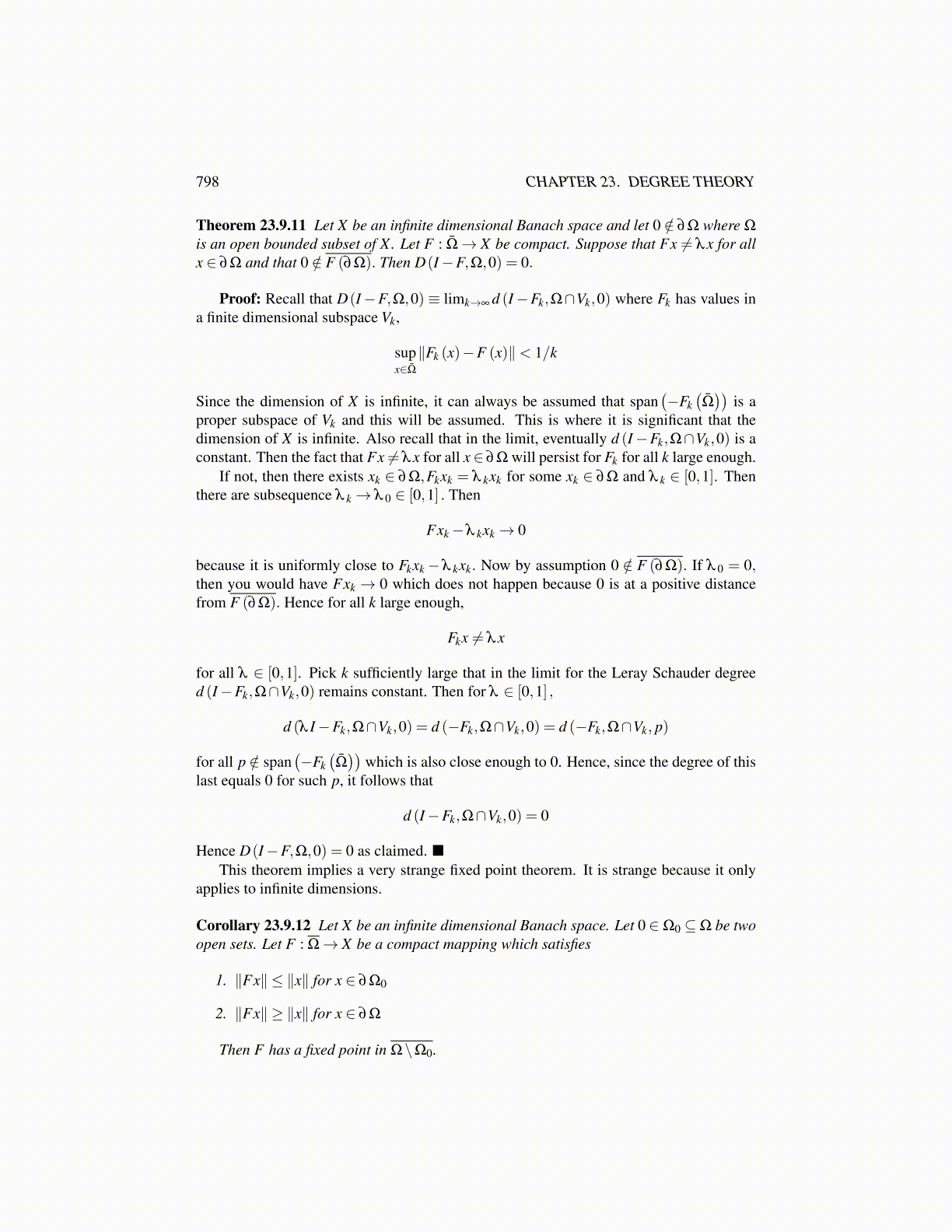
798 CHAPTER 23. DEGREE THEORY
Proof: Suppose there is t0 ∈ [0,1] such that t0 f has no fixed point. Then t0 ̸= 0.t0 fobviously has a fixed point if t0 = 0. Thus t0 ∈ (0,1]. Then let rM be the radial retractiononto B(0,M). By Schauder’s theorem there exists x∈B(0,M) such that t0rM f (x)= x. Thenif ∥ f (x)∥ ≤ M, rM has no effect and so t0 f (x) = x which is assumed not to take place.Hence ∥ f (x)∥ > M and so ∥rM f (x)∥ = M so ∥x∥ = t0M. Also t0rM f (x) = t0M f (x)
∥ f (x)∥ =
x and so x = t̂ f (x) , t̂ = t0 M∥ f (x)∥ < 1. Since M is arbitrary, it follows that the solutions
to x = t f (x) for t ∈ (0,1) are unbounded. It was just shown that there is a solution tox = t̂ f (x) , t̂ < 1 such that ∥x∥ = t0M where M is arbitrary. Thus the second of the twoalternatives holds.
There is a lot more on degree theory in [43]. Here is a very interesting theorem fromthis reference which pertains specifically to infinite dimensional spaces.
Theorem 23.9.11 Let X be an infinite dimensional Banach space and let 0 /∈ ∂Ω where Ω
is an open bounded subset of X. Let F : Ω̄→ X be compact. Suppose that Fx ̸= λx for allx ∈ ∂Ω and that 0 /∈ F (∂Ω). Then D(I−F,Ω,0) = 0.
Proof: Recall that D(I−F,Ω,0) ≡ limk→∞ d (I−Fk,Ω∩Vk,0) where Fk has values ina finite dimensional subspace Vk,
supx∈Ω̄
∥Fk (x)−F (x)∥< 1/k
Since the dimension of X is infinite, it can always be assumed that span(−Fk
(Ω̄))
is aproper subspace of Vk and this will be assumed. This is where it is significant that thedimension of X is infinite. Also recall that in the limit, eventually d (I−Fk,Ω∩Vk,0) is aconstant. Then the fact that Fx ̸= λx for all x∈ ∂Ω will persist for Fk for all k large enough.
If not, then there exists xk ∈ ∂Ω,Fkxk = λ kxk for some xk ∈ ∂Ω and λ k ∈ [0,1]. Thenthere are subsequence λ k→ λ 0 ∈ [0,1] . Then
Fxk−λ kxk→ 0
because it is uniformly close to Fkxk−λ kxk. Now by assumption 0 /∈ F (∂Ω). If λ 0 = 0,then you would have Fxk → 0 which does not happen because 0 is at a positive distancefrom F (∂Ω). Hence for all k large enough,
Fkx ̸= λx
for all λ ∈ [0,1]. Pick k sufficiently large that in the limit for the Leray Schauder degreed (I−Fk,Ω∩Vk,0) remains constant. Then for λ ∈ [0,1] ,
d (λ I−Fk,Ω∩Vk,0) = d (−Fk,Ω∩Vk,0) = d (−Fk,Ω∩Vk, p)
for all p /∈ span(−Fk
(Ω̄))
which is also close enough to 0. Hence, since the degree of thislast equals 0 for such p, it follows that
d (I−Fk,Ω∩Vk,0) = 0
Hence D(I−F,Ω,0) = 0 as claimed.This theorem implies a very strange fixed point theorem. It is strange because it only
applies to infinite dimensions.